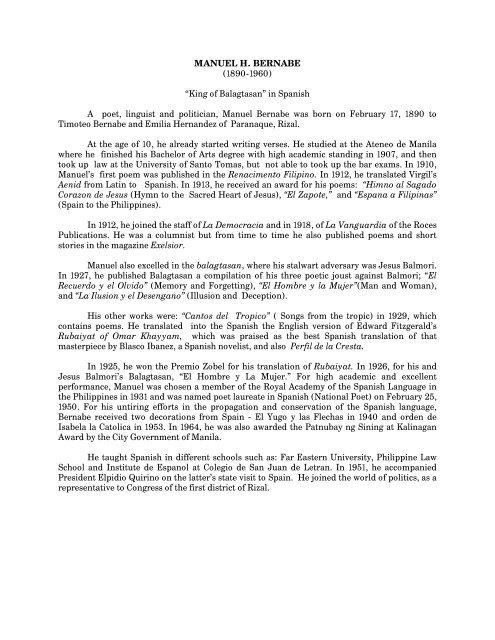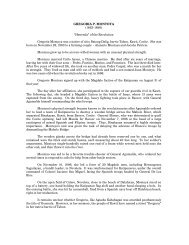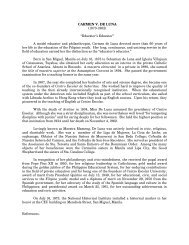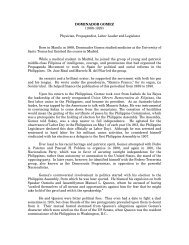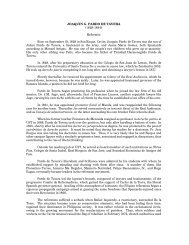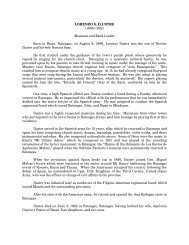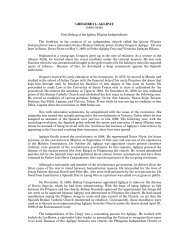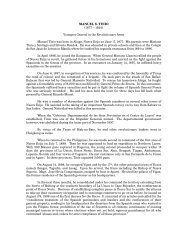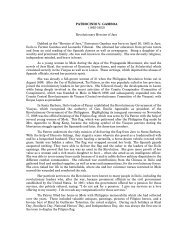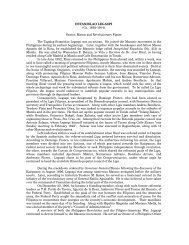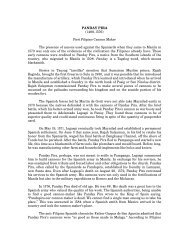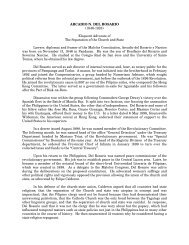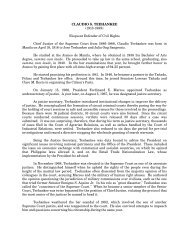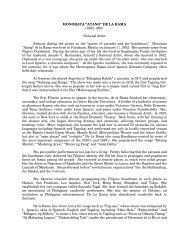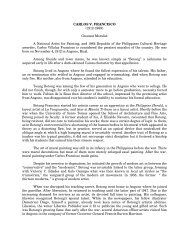MANUEL H. BERNABE (1890-1960) “King of Balagtasan” in ...
MANUEL H. BERNABE (1890-1960) “King of Balagtasan” in ...
MANUEL H. BERNABE (1890-1960) “King of Balagtasan” in ...
You also want an ePaper? Increase the reach of your titles
YUMPU automatically turns print PDFs into web optimized ePapers that Google loves.
<strong>MANUEL</strong> H. <strong>BERNABE</strong><br />
(<strong>1890</strong>-<strong>1960</strong>)<br />
<strong>“K<strong>in</strong>g</strong> <strong>of</strong> <strong>Balagtasan”</strong> <strong>in</strong> Spanish<br />
A poet, l<strong>in</strong>guist and politician, Manuel Bernabe was born on February 17, <strong>1890</strong> to<br />
Timoteo Bernabe and Emilia Hernandez <strong>of</strong> Paranaque, Rizal.<br />
At the age <strong>of</strong> 10, he already started writ<strong>in</strong>g verses. He studied at the Ateneo de Manila<br />
where he f<strong>in</strong>ished his Bachelor <strong>of</strong> Arts degree with high academic stand<strong>in</strong>g <strong>in</strong> 1907, and then<br />
took up law at the University <strong>of</strong> Santo Tomas, but not able to took up the bar exams. In 1910,<br />
Manuel’s first poem was published <strong>in</strong> the Renacimento Filip<strong>in</strong>o. In 1912, he translated Virgil’s<br />
Aenid from Lat<strong>in</strong> to Spanish. In 1913, he received an award for his poems: “Himno al Sagado<br />
Corazon de Jesus (Hymn to the Sacred Heart <strong>of</strong> Jesus), “El Zapote,” and “Espana a Filip<strong>in</strong>as”<br />
(Spa<strong>in</strong> to the Philipp<strong>in</strong>es).<br />
In 1912, he jo<strong>in</strong>ed the staff <strong>of</strong> La Democracia and <strong>in</strong> 1918, <strong>of</strong> La Vanguardia <strong>of</strong> the Roces<br />
Publications. He was a columnist but from time to time he also published poems and short<br />
stories <strong>in</strong> the magaz<strong>in</strong>e Exelsior.<br />
Manuel also excelled <strong>in</strong> the balagtasan, where his stalwart adversary was Jesus Balmori.<br />
In 1927, he published Balagtasan a compilation <strong>of</strong> his three poetic joust aga<strong>in</strong>st Balmori; “El<br />
Recuerdo y el Olvido” (Memory and Forgett<strong>in</strong>g), “El Hombre y la Mujer”(Man and Woman),<br />
and “La Ilusion y el Desengano” (Illusion and Deception).<br />
His other works were: “Cantos del Tropico” ( Songs from the tropic) <strong>in</strong> 1929, which<br />
conta<strong>in</strong>s poems. He translated <strong>in</strong>to the Spanish the English version <strong>of</strong> Edward Fitzgerald’s<br />
Rubaiyat <strong>of</strong> Omar Khayyam, which was praised as the best Spanish translation <strong>of</strong> that<br />
masterpiece by Blasco Ibanez, a Spanish novelist, and also Perfil de la Cresta.<br />
In 1925, he won the Premio Zobel for his translation <strong>of</strong> Rubaiyat. In 1926, for his and<br />
Jesus Balmori’s Balagtasan, “El Hombre y La Mujer.” For high academic and excellent<br />
performance, Manuel was chosen a member <strong>of</strong> the Royal Academy <strong>of</strong> the Spanish Language <strong>in</strong><br />
the Philipp<strong>in</strong>es <strong>in</strong> 1931 and was named poet laureate <strong>in</strong> Spanish (National Poet) on February 25,<br />
1950. For his untir<strong>in</strong>g efforts <strong>in</strong> the propagation and conservation <strong>of</strong> the Spanish language,<br />
Bernabe received two decorations from Spa<strong>in</strong> - El Yugo y las Flechas <strong>in</strong> 1940 and orden de<br />
Isabela la Catolica <strong>in</strong> 1953. In 1964, he was also awarded the Patnubay ng S<strong>in</strong><strong>in</strong>g at Kal<strong>in</strong>agan<br />
Award by the City Government <strong>of</strong> Manila.<br />
He taught Spanish <strong>in</strong> different schools such as: Far Eastern University, Philipp<strong>in</strong>e Law<br />
School and Institute de Espanol at Colegio de San Juan de Letran. In 1951, he accompanied<br />
President Elpidio Quir<strong>in</strong>o on the latter’s state visit to Spa<strong>in</strong>. He jo<strong>in</strong>ed the world <strong>of</strong> politics, as a<br />
representative to Congress <strong>of</strong> the first district <strong>of</strong> Rizal.
He retired from politics and once more jo<strong>in</strong>ed the journalistic pr<strong>of</strong>ession <strong>in</strong> the La<br />
Vanguardia. He was appo<strong>in</strong>ted pr<strong>of</strong>essor <strong>of</strong> Spanish at the University <strong>of</strong> the Philipp<strong>in</strong>es and a<br />
technical assistant for Filip<strong>in</strong>o-Spanish Relations at Malacañang from 1943-1947.<br />
Bernabe died <strong>of</strong> coronary thrombosis on November 29, <strong>1960</strong>, at barrio La Huerta,<br />
Paranaque, as he was hav<strong>in</strong>g conversation with his friends, he collapsed and never rega<strong>in</strong>ed<br />
consciousness.<br />
References:<br />
CCP Encyclopedia <strong>of</strong> Philipp<strong>in</strong>e Arts. Manila : Cultural Center <strong>of</strong> the Philipp<strong>in</strong>es, 1994.<br />
Galang, Zoilo M. Encyclopedia <strong>of</strong> the Philipp<strong>in</strong>es Volume 9 Builders <strong>of</strong> the New Philipp<strong>in</strong>es.<br />
Manila : P. Vera & Sons Co., 1936.<br />
Quir<strong>in</strong>o, Carlos. Who’s Who <strong>in</strong> Philipp<strong>in</strong>e History. Manila : Tahanan Books, 1995.<br />
Villaroel, Hector K. Em<strong>in</strong>ent Filip<strong>in</strong>os. Quezon City: Textbook Publishers, 1965.


